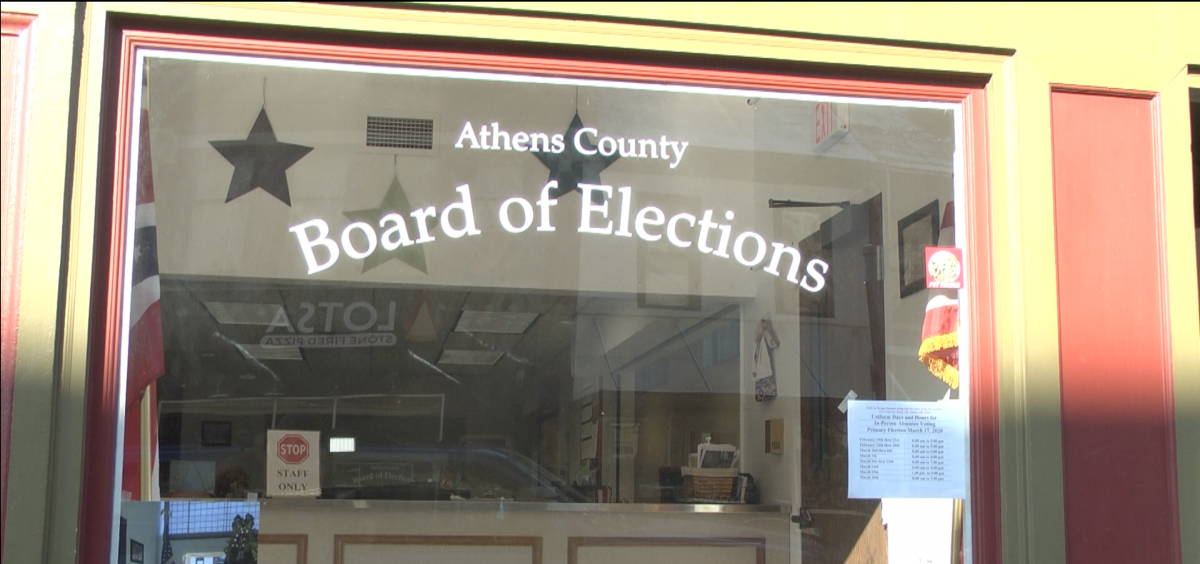
Student Voters Could Decide City Elections in Athens County
By: Anna Hoffman
Posted on:
The 2020 presidential election has been on voters’ minds for months, and for many Ohioans it will be the only election they choose to take part in for the next four years.
Local elections can have a much larger impact on a people and communities’ daily life. Those who choose to vote in local elections will have a chance to cast their ballots many more times before 2024. However, turnout for off-year elections is much lower to than turnout for federal election years.
Debra Quivey has worked for the Athens Board of Elections for 28 years, 14 of those years she has served as its director. She is always encouraging people to come out and vote locally, but she said she is aware that a lot of people ignore her words.
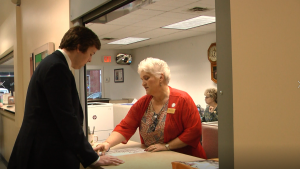
“I always say it’s kind of like leading a horse to water,” said Quivey. “You can lead a horse to water but you can’t make it drink. You can get those people to register, but that doesn’t mean you’re going to get them to vote.”
Student Voter Turnout
A large number of those registered who are not voting in Athens County are college students who claim permanent residency in the county. When incoming students walk on campus for orientation there are groups surrounding them saying they need to choose to register here in Athens or vote absentee in their home county.
Naturally, many students will register to vote in Athens because this is where they will spend the majority of their time. But will the registered students actually go to the polls and make an impact?
A strong example of the impact Ohio University students could have on Athens County elections is the local auditor race in the fall of 2018. The race included candidates from both the Democratic and Republican parties. The Republican, the incumbant auditor, won by 42 votes.
Baker Center at Ohio University is the voting location for six precincts, all student precincts, because of the dorms located around it. According to Quivey, the students who did not vote could have had a big impact on the outcome.
“Out of curiosity I went to look down and pulled out the statistics,” said Quivey. “I looked at it and over 700 students did not vote in that race.”
A lack of student turnout on that scale has large implications for the potential impact student voters could have on elections. Using the data from a precinct such as Baker Center can help clarify the effect of the numbers.
Data for Student Voting
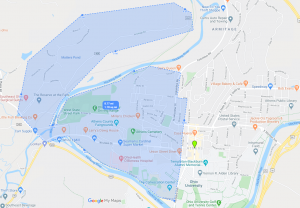
Using the records of voter registration addresses from Athens precinct 1-1, an estimated map can be drawn to show the areas of Athens that voters in precinct 1-1 reside.
By cross-referencing the list of all registered voters in Athens County precinct 1-1 with the list of students registered to the Athens campus of Ohio University, one can find the number of students who are register to votein Athens. According to that data, 47% of the voters for precinct 1-1 who can vote locally are, in fact, students.
That may sound like a lot, but the majority of those registered did not vote. For Athens’ voting precinct 1-1, almost 1,300 people are registered to vote but fewer than 300 voted in local elections.
Efforts to get Residents Registered
Getting students to register to vote is not the issue. The real battle is actually getting the students to the polls. Student political organizations work hard to get students politically involved each year. The organizations set-up tables around campus to hand out voter registration forms as well as educate the students about current political topics.
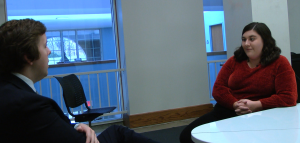
Meah McCallister is the president of the Ohio University College Democrats and works constantly to encourage students to vote.
“A big part of trying to get students involved is standing at trafficked areas, like College Green and Court Street, with clipboards,” said McCallister. “I make sure that everyone that comes to register people has training on what specific things need to be there and common things that are typically filled out the wrong way.”
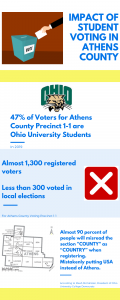 According to McCallister, mistakes in registration cause issues for many new voters. She said almost 90 percent of people will misread the section “county” as “country” when they are registering, and then mistakenly put U.S.A. instead of Athens.
According to McCallister, mistakes in registration cause issues for many new voters. She said almost 90 percent of people will misread the section “county” as “country” when they are registering, and then mistakenly put U.S.A. instead of Athens.
Both Quivey and McCallister are aware that some local residents do not like students voting. Despite that they both continue to push students to vote.
“If you are living here for four years and you want to register from here or vote from here, you have the right,” Quivey said. “To me, that would be like somebody moved here, maybe to work with the university and moved here, wasn’t a student, and they lived here four years and they decided, I’ll move, I got a better job opportunity somewhere else. I’ve always tried to look at it in that perspective.”
The way Quivey sees it, the more people who come out to vote the better. McCallister, and other students part of political organizations, have visions for the way the community they reside in should be run. Nonetheless, the passionate students who do exercise their right to vote are able to see their visions come to life.
“A lot of students here most don’t pay property taxes and with something that is that specific I can see how that would anger people who live here or genuinely upset them,” McCallister said. “My response to that would be to take away the financial influence of that, which I know is difficult, but to think more about what it is we’re voting on and more to what that money is going towards and what the end goals were.”
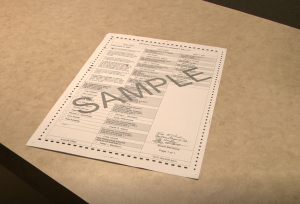
It is possible that many students are not educated about which local issues appear on the ballots for each election, and that’s why they don’t turnout for local elections. Although in election years like 2020, there is expected to be a new wave of eager 18-year-olds rushing to the polls to give their contribution to local and federal politics.
“This fall is going to be a different story,” Quivey said. “Because it’ll be the new group coming in. They register here, they’ll get excited, they’ll get invested in what’s going here. Like I said I don’t care where they vote or what, as long as they vote.”
With the Ohio primary postponed due to concerns over the COVID-19 pandemic, it is unclear what student voter turnout is expected to be for any upcoming elections. However, the numbers show that students have the potential to sway local government if enough of them cast their ballots.

